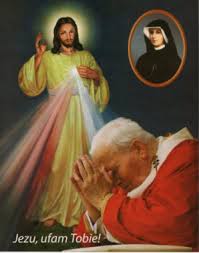On Sunday 24 April 2022, the Second Sunday of Easter, we celebrate the Divine Mercy Sunday. During the 1930’s St Maria Faustina Kowalska received a series of revelations in which Jesus spoke to her about the institution of the Divine Mercy Sunday.
In his homily at St Faustina’s canonization, on April 30, 2000, Pope St John Paul II spoke about it when he said: It is important then that we accept the whole message that comes to us from the word of God on this Second Sunday of Easter, which from now on throughout the Church will be called “Divine Mercy Sunday” (no.4).
It was Jesus himself who spoke at length about it in his very first revelation to St Faustina. In entry 699 of the holy Polish nun’s Diary, Jesus said: My daughter, tell the whole world about My inconceivable mercy. I desire that the Feast of Mercy be a refuge and a shelter for all souls, and especially for poor sinners. On that day the very depths of My tender mercy are open. I pour out a whole ocean of graces upon those souls who approach the fount of My mercy. The soul that will go to Confession and receive Holy Communion shall obtain complete forgiveness of sins and punishment. On that day are opened all the divine floodgates through which graces flow. Let no soul fear to draw near to Me, even though its sins be as scarlet. My mercy is so great that no mind, be it of man or of angel, will be able to fathom it throughout all eternity. Everything that exists has come from the very depths of My most tender mercy. Every soul in its relation to Me will contemplate My love and mercy throughout eternity. The Feast of Mercy emerged from My very depths of tenderness. It is My desire that it be solemnly celebrated on the first Sunday after Easter. Mankind will not have peace until it turns to the Fount of My mercy.
It needs to be remembered that Divine Mercy Sunday is, first and foremost, a feast which is founded on the Second Sunday of Easter, which at the time of St Faustina was by then a solemnity as the Octave Day of Easter. Nevertheless, the title Divine Mercy Sunday amplifies the deep significance of this day.
Jesus gave a special promise concomitant with this feast for the entire world. He said to St Faustina: My daughter, tell the whole world about My inconceivable mercy. I desire that the Feast of Mercy be a refuge and shelter for all souls, and especially for poor sinners. I pour out a whole ocean of graces upon those souls who approach the fount of My mercy (Diary, 699). Thrice in her Diary, St Faustina writes our Lord’s promises concerning particular and special graces connected with this Feast. In entry 1109 we find: I want to grant a complete pardon to the souls that will go to Confession and receive Holy Communion on the Feast of My mercy. The second promise is found in entry 300: Whoever approaches the Fountain of Life on this day will be granted complete forgiveness of sins and punishment. Whereas the last promise is to be detected in entry 699: The soul that will go to Confession and receive Holy Communion will obtain complete forgiveness of sins and punishment.
In order for one to receive these extraordinary graces it is important that the person receives the Holy Communion on Divine Mercy Sunday or the celebration’s Vigil by doing a sincere confession whilst staying in the state of grace and keep trusting in Jesus’ Divine Mercy. Thanks to these conditions, we easily notice Jesus’ strong emphasis on the value of confession together with Holy Communion. Are these not miracles of his unfathomable mercy? After all, is the Eucharist not Jesus Himself who is heartily desiring to pour Himself into our hearts as Mercy?
Moreover, Jesus also tells St Faustina that we are to do acts of mercy. He said in entry 742 of the Diary: Yes, the first Sunday after Easter is the Feast of Mercy, but there must also be acts of mercy. Having said that, trust is the decisive factor through which the graces attached to his mercy will be finally achieved. In entry 1578 Jesus says: The graces of My mercy are drawn by means of one vessel only, and that is trust. The more a soul trusts, the more it will receive. Let us highlight once more that the worthy reception of the Eucharist on Divine Mercy Sunday is enough to achieve the exceptional graces which Jesus promised.
In the Divine Mercy Sunday Jesus wanted that his Divine Mercy Image be venerated. It was the Lord Himself, the Merciful Saviour, who directed St Faustina to have his appearance painted and be publicly venerated. He told her: I want the Image to be solemnly blessed on the first Sunday after Easter, and I want it to be venerated publicly so that every soul may know about it (Diary, 341).
The Image carries with it a very deep meaning. To begin with our Risen Lord has pale and red rays coming from His side. Both of them mean the Blood and Water which flowed from His side as he was crucified. However, when he appeared to St Faustina these rays had been changed into glorious ones, so as to show how they are, indeed, an immense fount of healing graces which benefit us sinners who turn to Jesus with utmost trust. It is in this sense that the Image carries with it the inscription Jesus, I trust in You!
Let us, while gazing at the Divine Mercy Image, we let him help us trust in Him and do works of mercy by sincerely replying to his call to be merciful just as He has always shown mercy to us.












